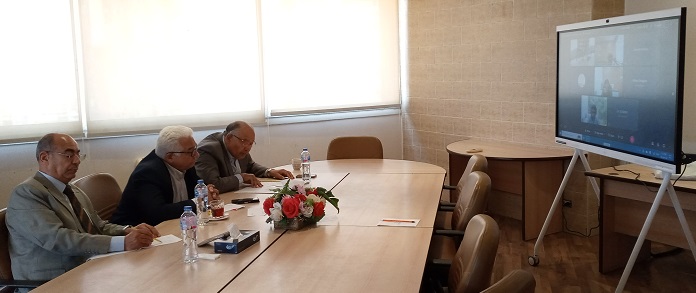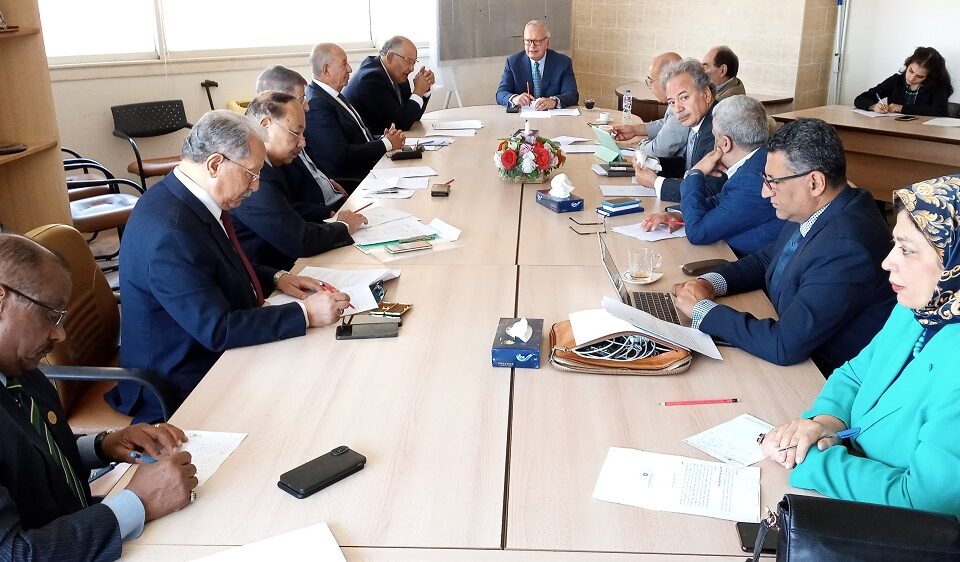ECFA has participated in the Joint Training Course on Disarmament
October 4, 2017Bilateral Relations and Hot Issues in the Visit by ECFA Delegation to Sudan
October 12, 2017
On 8th October 2017, in the presence of the chairman and the manager of the Council and a number of Experts and academics, such as Dr. Yousry Abu Shady- a Member of the Council, and who attended most of the conference activities, reviewed the summary report which he prepared on The outcomes of 61st IAEA General Conference referring to the following points in particular:
-
Delegations:
There were 168 countries invited to attend the conference, but only 152 countries had the right to vote on the resolutions, and there were also 16 States that did not meet its material obligations to the Agency.
– Maria Collinsen – Ambassador of the Philippines was selected to chair the conference.
– Egypt was represented by a delegation headed by ambassador .Dr. Mohamed Shaker – the Minister of Electricity, Ambassador of Egypt to Austria Omar Amer, and a number of nuclear authorities’ heads in Egypt, as well as the Ministry of Foreign Affairs.
2-Conference Highlights:
-
At the opening session, the General Director of the Agency- Yukiya Amano, was renewed for a third term and it will ending in November 2021, and the State of Grenada was accepted. Thus, the total number of members the Agency states has become (169).
-
The IAEA agenda was approved without any discussion or voting, including the item on Israeli nuclear capabilities, which was subsequently submitted by the Arab states despite the Israeli objection.
-
The Agency budget for 2018 was approved and amounted to $ 365 million, In addition to $ 85 million a voluntary participation (most of them from the United States), it appears to be the highest number in the agency’s history.
-
As a representative of Egypt – Dr. Shaker delivered his speech in the first morning session, about the imminent construction of El Dabaa nuclear power plant, and Egypt’s need for energy from various sources. He also called all countries of the Middle East for joining to the Nuclear Non-Proliferation Treaty (NPT) and to subject all nuclear facilities in the region to the IAEA.
-
The Israeli representative strongly attacked all Arab countries for not cooperating in the field of regional security and also for presenting the item on Israel’s nuclear capabilities, in particular Iran and Syria. He mentioned before that there were four countries in the region do not abide by the safeguards system as a justification for rejecting the Arab item, but he did not specify them. (Mr. Abu Shady estimates that Iran and Syria are among the four countries, but the question is about the other two countries. Is Egypt among them because of the file that was submitted in 2005-2009, or is the two countries concerned Iraq and Libya?).
-
Egypt submitted a draft resolution on the implementation of the Agency’s safeguards system and the evacuation of the Middle East region from nuclear weapons and mass destruction weapons, this decision which Egypt used to submit annually and get approval without any mechanism to implement it, Perhaps the most important reason for approval was not explicitly mentioning Israel’s name in the resolution.
-
As usual, Israel objected to the second item of the resolution, concerning “The need for all countries of the region to accede to the Non-Proliferation Treaty (NPT), and also requested for a special voting on this item, Which led Egypt to demand a double votes specially on this item and the resolution as a whole, this scenario has been repeated annually for many years. Accordingly the voting result was as follows:
–The second item was approved by (123) countries and was rejected by one State (Israel), and there are six States abstained from voting (United States / Canada / India / Rwanda / Togo / Malawi), and India’s justification for abstention was; it does not believe that the IAEA is politically responsible for the treaty.
–The resolution as a whole was approved by 123 countries and was not rejected by any country, but there were five countries abstained from voting (the United States, Israel, Canada, Togo and Malawi) with 96.1%, and this is the highest percentage in the history of this resolution.
It is clear, from the metionned high rate that, some African countries changed they attitude in a positive way, which may reflect the improvement of Egyptian-African relations.
-
On behalf of the Arab States Iraq submitted, the reasons for the inclusion of the item on Israeli nuclear capabilities, and as a reaction, it did not submit any resolution to this voting, and that for two consecutive years.
Because there were strong objections against this item, particularly from Israel, the United States, Canada and the European Union, Which means that if this resolution, had been submitted to the vote, will face failure. That’s why The United States has repeatedly mentioned the need to focus on direct regional talks as the best way.
-
“Eleventh” new countries were elected as members of the Board of Governors, and Egypt was not among them despite being outside the Council for two years. And this is the first time in the Agency’s history that Egypt has been outside the Council for three consecutive years; the reason seems to be administrative rather than political.
-
There are about “175” countries that have acceded to the Additional Protocol to the Treaty and 10 countries have not joined, including Egypt, where they signed but did not accede.
The conference witnessed many side events, such as art exhibitions and scientific seminars.
At the end of the presentation, he concluded a set of points, as follows:
-
As in previous years, the United States supported Israel’s regional talks and direct negotiations between the countries of the region, opposing the Arab call for the Director of the Agency to activate the inspection in Israel and all its nuclear facilities.
-
He pointed out that the decision adopted by the Arab League was submitted for discussion within the meeting and was not presented by the Arab League to vote generally, due to the strong opposition to the resolution by European countries and a number of African countries, As it somehow refers to Israel in its call to all States to accede to the Treaty.
-
And he strongly stressed the necessity for Egypt signature on the Comprehensive Nuclear Test Ban Treaty (CTBT) with both countries Iran and Israel before 2020.
-
On the Iranian nuclear program, he confirm that Iran’s commitment to the agreement with the Group of 5 + 1, pointing out that the American delegate of the organization visit the headquarters of the Agency, and to see the activities of the inspection by the agency in Iran, and Iran allowed the Agency to inspect on the military facilities (in spite of the nuclear agreement with it did not explicitly stated that, but the agreement gave Iran the right to ask the inspectors about the reasons for the visit).
-
He referred to the global nuclear progress of a number of countries, including China, which is currently adopting a trend to build new reactors, the intention to enter the market to build reactors and produce nuclear energy for long-term competition. Japan also announced the return of five reactors which ceased in the aftermath of the second World War; approximately 50 Japanese reactors are expected to return to work within 10 years, while Russia has announced the establishment and expansion of new reactors, as well as contracts to build new nuclear power plants for peaceful purposes in Egypt and Jordan. As well as contracts for the construction of new nuclear power plants for peaceful purposes in Egypt and Jordan.






